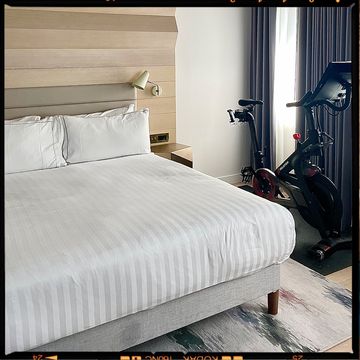At a time when women’s reproductive rights feel under threat globally, positive news around how we access this essential healthcare is welcome.
And such an example is the government’s announcement that, for the first time ever in England, the morning-after pill will be available to pick up for free from pharmacies.
The change is due to come into effect from later this year, putting an end — say ministers — to the ‘postcode lottery’ of pharmacy-based access.
“Safe and effective contraception is crucial to women’s healthcare and [is] a cornerstone of a fair society,” said health minister Stephen Kinnock.
Right now, some councils fund free prescriptions while elsewhere women can pay up to £30 for the medication. That’s no small expense, especially if not split with the partner from the night before, or for women on low incomes.
And while it is currently available for free from sexual health clinics and GPs, lacking the time or flexibility at work to attend sexual health clinics can be a barrier — as can your local GP surgery having no spare appointments for weeks.
They’re barriers that can lead to the medication being “significantly underutilised”, according to the British Pregnancy Advice Service (BPAS) — with only one in three UK women using it after unprotected sex.
A reminder: despite its name, the morning-after pill can be taken within three to five days of having unprotected sex, but it’s more effective the earlier it’s taken.
But campaigners including BPAS, who welcome the news, say that in order to truly improve access, the government needs to reclassify the medication.
Women who’ve experienced an unplanned pregnancy, the organisation has said, report that the requirement to undergo a mandatory consultation with a pharmacist deterred them from accessing emergency contraception when they needed it.
In a social media post, they flagged that women are too often being turned away due to a pharmacist not being available, or they’re not being adequate stock.
They’re calling for the government to apportion enough funding and training of pharmacists to deliver the scheme — but also, for them to go further.
They’re calling for the government to reclassify emergency contraception from a ‘Pharmacy’ medicine to a ‘General Sales List’ medicine.
According to BPAS: “This would allow women to purchase the medication straight from the shelves without a mandatory consultation across retail outlets, as happens in many other countries including the US, Sweden, and Norway.”
Watch this space. And, in the meantime, remember that the morning-after pill is not a silver bullet in terms or pregnancy protection — and nor does it protect you against STIs.

Roisín Dervish-O’Kane is Women’s Health’s multi-award-winning Features Director and Chief Interviewer. From her zeitgeist-capturing commissions to profile interviews that spark global media conversations, her journalism gets right to the heart of the biggest talking points across health, society, culture - and their fascinating intersection.
Heading up WH’s industry-leading features offering, she plans, commissions and edits longform features across the site and magazine on everything from why medical sexism leads women to self-diagnose online and the lasting biological harms of emotional self-suppression to whether the booming longevity industry’s claims tally with the research base. She also launched Well Opinionated, the home of incisive, reactive comment on health news, politics and the latest wellness world controversies.
An experienced presenter - she’s hosted The Women’s Health and Intelligence Squared podcasts - you can find her in front of the camera, drawing out the health stories of WH’s cover stars.
Roisín has been named Writer of The Year by the PPA and made their 30 under 30 list. Her writing has also been recognised by the Medical Journalists Association and Guild of Health Writers, while The Women's Health Podcast, which she produced and hosted, earned a highly commended for 'Best Health Podcast' at the Publisher Podcast Awards.
She is also a regular news review contributor on BBC radio, an experienced panel host - and speaker.













